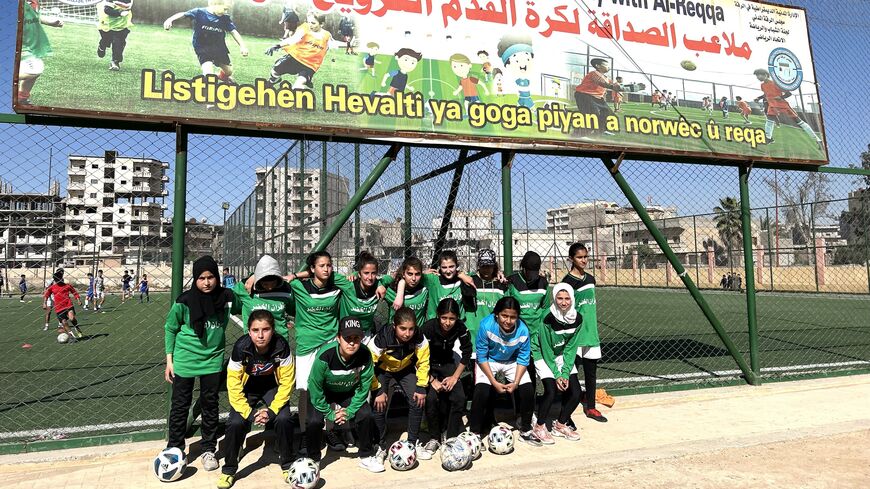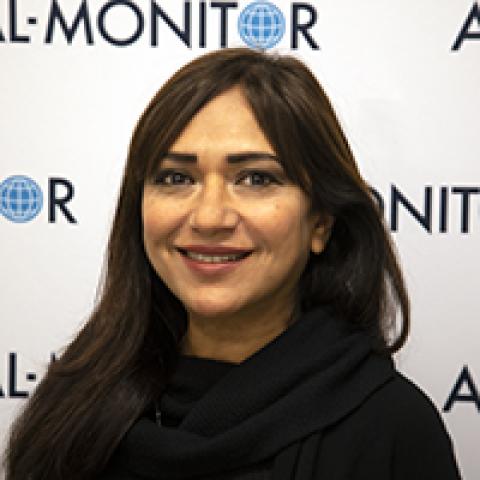RAQQA, Syria — In Raqqa, the erstwhile capital of the Islamic State (IS), a slim woman shrouded in black squints through the slits of her veil, dribbles a soccer ball then sends it into the net with a firm kick. Elsewhere across the sun-soaked pitch, young girls warm up, some covered and others not, whooping and joking as boys on an adjacent field look on. Aged between 10 and 14, they are members of Raqqa’s first-ever girls’ soccer team. Exuberance permeates the air.
The scene is nothing short of “revolutionary,” asserted Abdurrazaq Al Ahmed Slash, president of the city’s junior soccer league, smiling proudly as he gestured toward the girls. “We are changing the mentality here,” he told Al-Monitor. “It’s slow, but it’s happening.”
Less than six years ago, when IS still reigned over Raqqa, nobody dared to watch soccer let alone play it in the open. In Mosul, the caliphate’s other major outpost in neighboring Iraq, 13 teenage boys who defied the rule, watching an Asian Cup match between Jordan and Iraq, were rounded up and publicly executed by a firing squad. At Raqqa’s “black” soccer stadium, thus named because of its dark stone structure, public beheadings touted as family entertainment were the only “sports” on display. Beneath the stadium, in locker rooms converted into torture chambers, an untold number died.
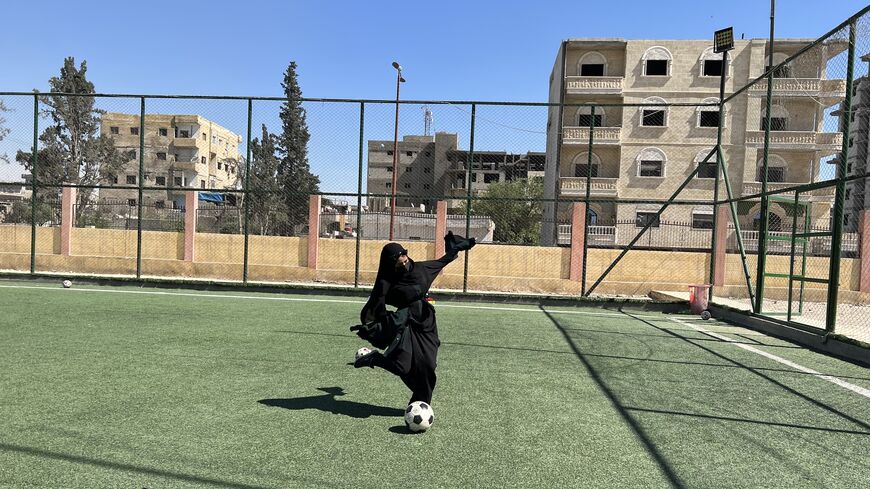
Sewsan Hemadah, a 22-year-old martial arts teacher, playing soccer in Raqqa, April 25, 2023. (Amberin Zaman/Al-Monitor)
Life was hardest on women and girls. They were permitted to move in public only if accompanied by males and wearing double-layered veils, loose chadors and gloves. The garments had to be black. Girls as young as 4 and 5 were not exempt from the dress code. Those who disobeyed were brutalized by IS religious police known as the Hisbah and slapped with heavy fines.
K-pop and Ronaldo
What would the Hisbah have made of 13-year-old midfielder Rama, who told Al-Monitor, “I don’t want to get married or have a family.” Or Mahanna, a bubbly 14-year-old who, like all of the girls here, wants to become a professional soccer player. She “loves” the Portuguese soccer legend Cristiano Ronaldo, wants to learn English and listens to K-pop. “I am from Raqqa. I don’t want to think about such a question,” said Ahmed Abeid, who coaches the girls.
The girls' team was formally established in June 2022. As word spread, a growing number of girls signed up, some 32 in total, Abeid told Al-Monitor. Most are Arabs. It wasn’t until the start of this year that the twin pitches, funded by a private Norwegian initiative, were completed and the girls began to play.
The Oslo-based board of the Norwegian initiative told Al-Monitor in an emailed statement that the results of the project were “absolutely overwhelming” and the response “much bigger than we had hoped for,” with grants flowing from “dozens of football clubs and trade unions.” The aim is “first and foremost to enable these children to experience joy and a feeling of being safe,” the board said.
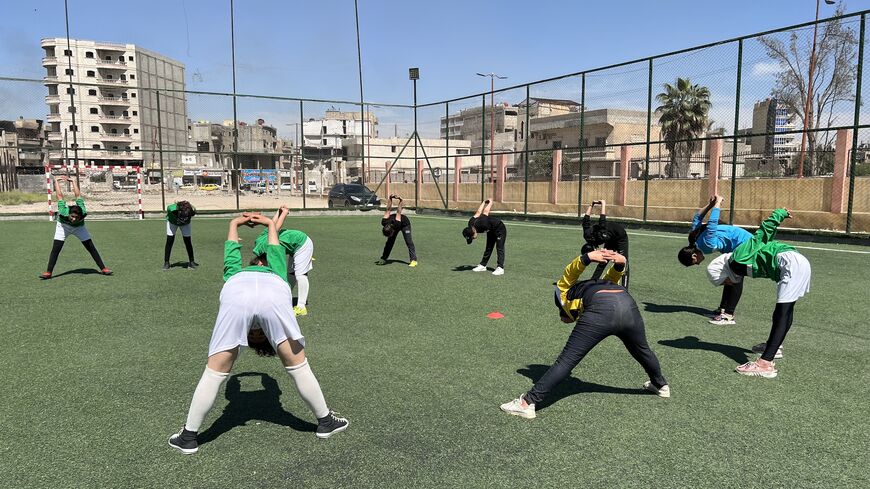
It’s also about reversing Raqqa’s bloody image. “We wanted to do this project so people would look at us in a different way, to create life for the girls after so much darkness,” Abeid said.
How did the girls’ parents feel about a male coach? “The parents are totally fine with this. They trust me,” Abeid explained.
He was planning to take them to play another girls’ team in Qamishli, the administrative capital on the Turkish border. “But we don’t have enough money to pay for the trip,” Abeid lamented.
Abeid has had to fish into his own meager savings to buy soccer balls and uniforms for the girls.
Nowrouz Mohamed, who came to watch her two daughters play, said, “I am very happy that my girls are playing soccer.” “Before there was no life in Raqqa, only death,” she told Al-Monitor.
Like many here, Abeid credits the Kurdish-led autonomous administration that has been governing Raqqa and other former IS strongholds in north and east Syria for creating an environment in which to execute such plans. The fledgling body, operating under US military protection, is ideologically inspired by Abdullah Ocalan, the imprisoned Kurdish leader. Ocalan founded the outlawed Kurdistan Workers Party and led its armed campaign against the Turkish state from his sanctuary in Syria until he was forced out and captured by Turkish forces in Kenya in 1999.
Jin Jiyan Azadi
Ocalan’s radical brand of feminism has seen women share power in government and lead some of the most effective battles against IS. Their courage earned sympathy and admiration across the globe. “Jin Jiyan Azadi,” Kurdish for “Women, Life, Freedom,” became the rallying cry of millions of Iranian women who rose up last year following the death in police custody of Kurdish woman Mahsa Amini. The slogan was coined by the Ocalan-led movement.
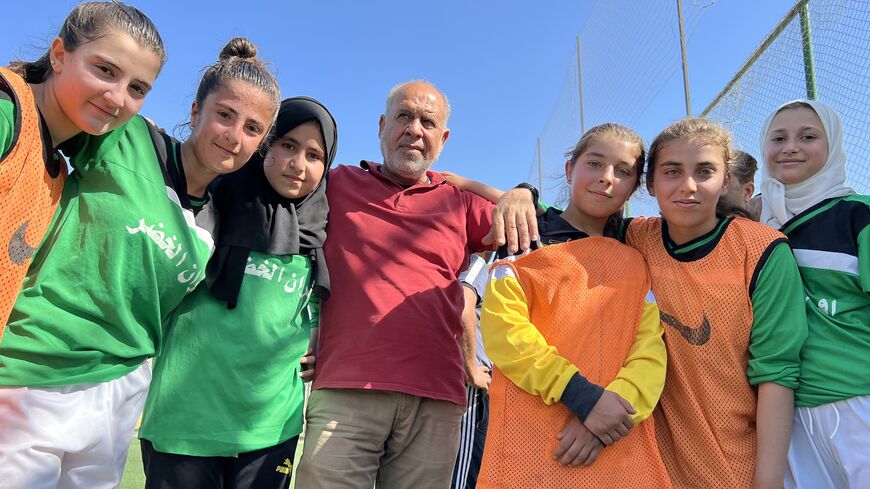
Girls’ soccer coach Ahmed Abeid posing with his team in Raqqa, April 25, 2023. (Amberin Zaman/Al-Monitor)
“Empowering women is one of the main pillars of our democratic project,” said Fawza Yusuf, a top Syrian Kurdish official who met Ocalan in Syria and says she was deeply influenced by his ideas. “We are trying to promote women at every level of society,” Yusuf told Al-Monitor.
Many of those ideas do not sit well in Arab-majority areas where religious conservatism runs strong. The malaise is palpable in Deir ez-Zor where tribal codes surrounding female “honor” remain stubbornly rooted and IS still finds recruits.
In Raqqa, too, the battle for hearts and minds is far from won. The scars of war are everywhere. Buildings cratered by coalition airstrikes line potholed streets. Drinking water and electricity are a luxury despite a steady flow of aid from the United States and other international donors. The city recently suffered a cholera outbreak along with other towns in the US-protected zone.
The region’s majority Arab population chafes at what the International Crisis Group called the Kurdish-led administration’s “overbearing” ways and its alleged promotion of Kurdish cadres over others. The enormous gulf separating those who earn dollar salaries working for Western-funded organizations and the rest who struggle to put bread on the table adds to the tensions.
The Norwegian donors who have funded separate pitches in the Kurdish-majority town of Kobane emphasize that they have no political agenda. “It is a completely neutral project when it comes to politics. Joy to children — that’s it,” the board stressed.
Queried about the girls’ team, a tailor at the local bazaar aired disgust. “What do you think when a girl is following a ball,” he sneered before striding away. However, a clutch of boy apprentices took a different view. “It’s OK for girls to play soccer,” said Aboud, 15. “Why not?” another piped in.
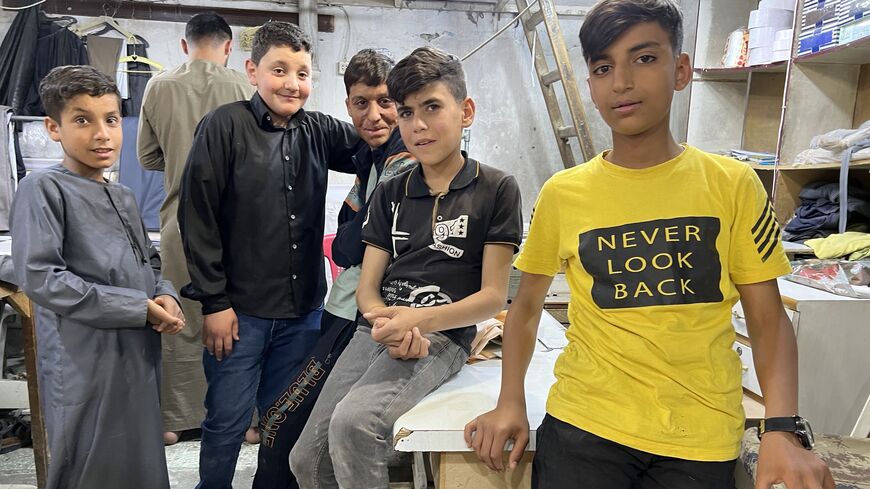
These tailor’s apprentices in Raqqa say it’s "OK” for girls to play soccer, April 25, 2023. (Amberin Zaman/Al-Monitor)
“Families are not always happy about the changes, but society simply has no bandwidth to ‘control’ women as they used to,” explained Hassan Hassan, founder and editor-in-chief of the Washington-based New Lines magazine, who is from Raqqa. “It’s surprising how stuff that used to cause violence and trouble is now tolerated, with women making their own decisions, traveling without family consent, eloping with people they want to marry and so on,” Hassan told Al-Monitor. “These are a big deal in a conservative tribal society that emphasizes honor and chastity, as they define it.”
Amid a sea of adversity, including Turkey’s unremitting attacks against civilian infrastructure, northeast Syria remains the least oppressive and most stable and Western-oriented part of Syria today.
Ahmed Sayyir runs a sports store in central Raqqa where he sells soccer balls, uniforms and various other goods he imports from Turkey, China and the United Arab Emirates. During IS rule, the shop remained open but business was down to a trickle. Sayyir would sell balls to fighters who played soccer within the confines of their compounds but never outdoors. “They forced me to grow a beard and pay taxes. Every day we experienced violence,” he recalled.
“Life is good now, except for public services,” Sayyir told Al-Monitor. As for girls playing soccer, “Society has accepted the idea,” Sayyir observed.
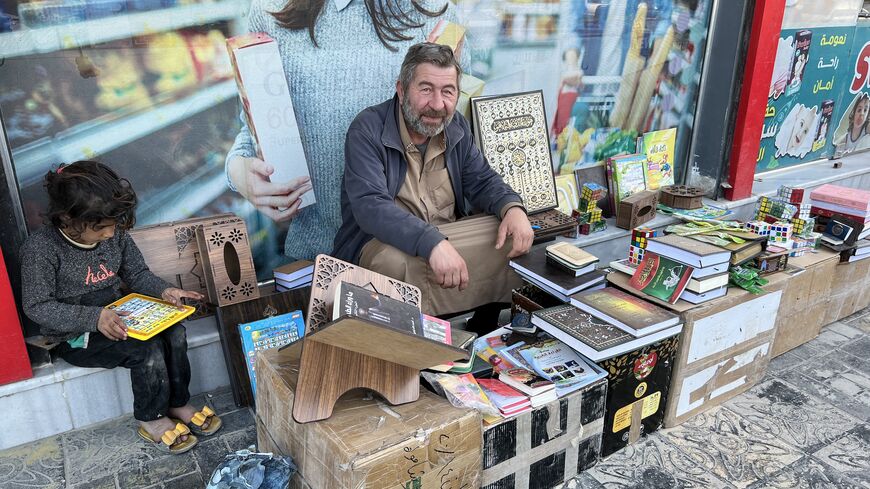
A man selling religious books on a sidewalk in central Raqqa, April 25, 2023. (Amberin Zaman/Al-Monitor)
Back at the soccer pitch, Sewsan Hemadah, the black-swathed goal scorer, is here to chaperone her 15-year-old sister Sulaf who plays on the team. Hemadah, 22, teaches martial arts to care for her mother and seven siblings. “My father died, so I am now the breadwinner,” she explained. The family, ethnic Arabs from Raqqa, had moved to Damascus when IS took over. The secular culture aggressively promoted by the Assad regime allowed the young woman to acquire her sporting skills. They returned to Raqqa a year ago.
“It's better than under Bashar [al-Assad] here. We are all freer now. I earn more money,” Hemadah told Al-Monitor. “And it’s good my sister plays soccer,” she added. “Like our mama says, it’s better than doing bad things.”

